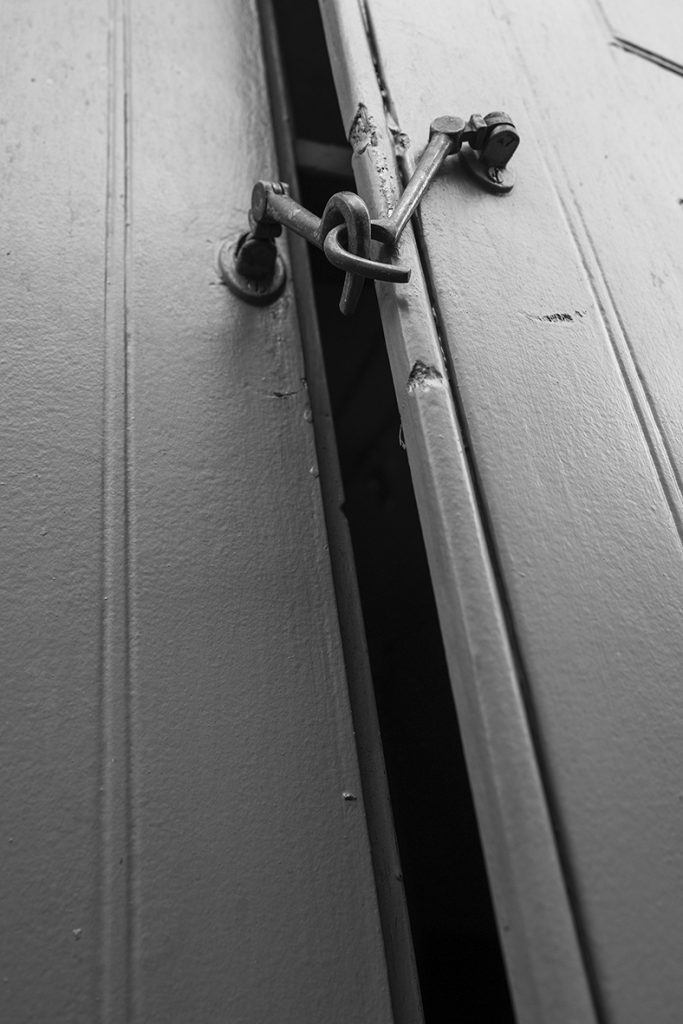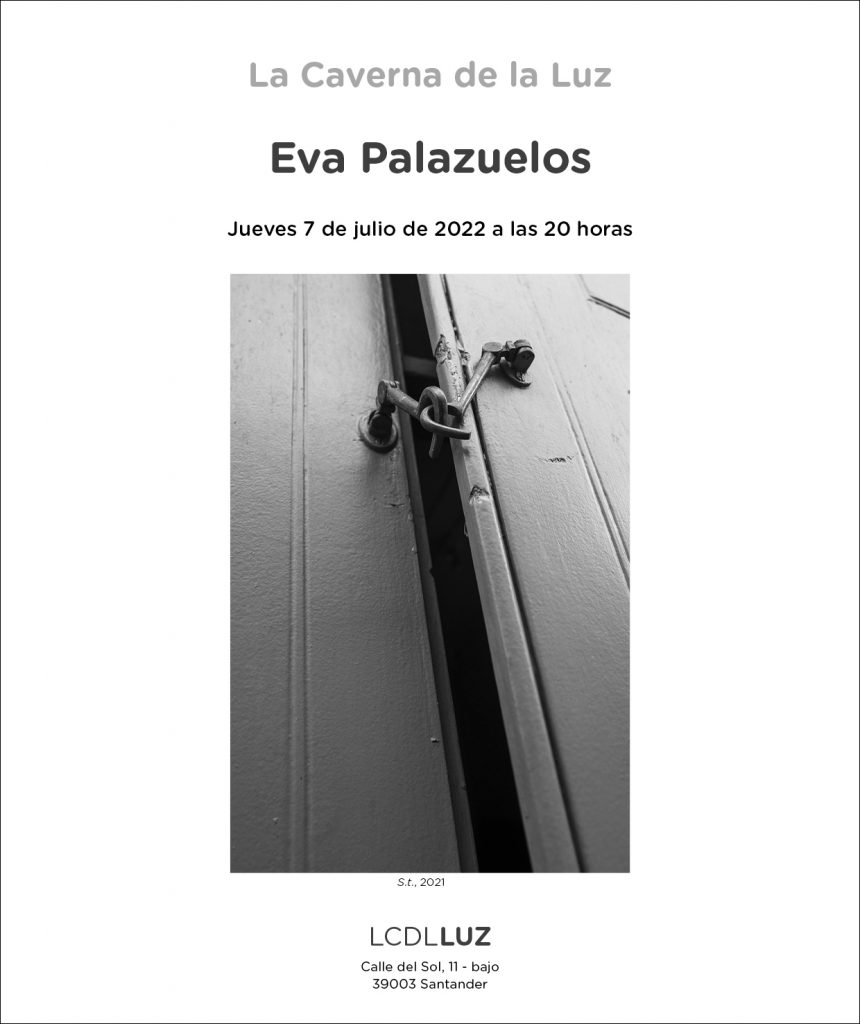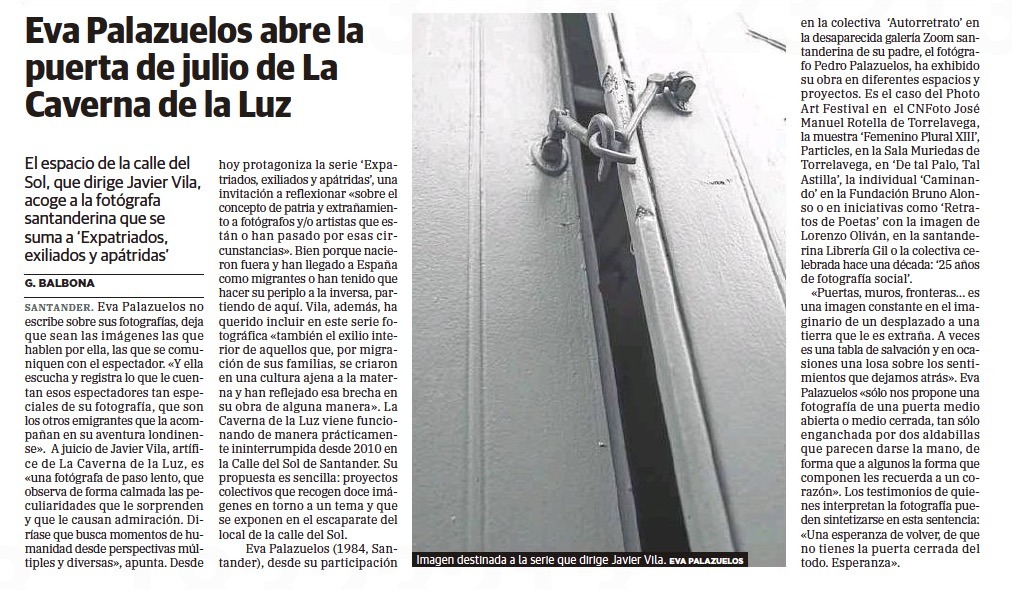
Eva Palazuelos no escribe sobre sus fotografías, deja que sean las imágenes las que hablen por ella, las que se comuniquen con el espectador. Y ella escucha y registra lo que le cuentan esos espectadores tan especiales de su fotografía, que son los otros emigrantes que la acompañan en su aventura londinense.
“Es como una puerta cerrada. Es como si no fueras bienvenido aquí…”
“Lo primero que me vino a la mente es la palabra… Anhelo. Ya sabes… aferrarse a algo y tener que dejarlo ir…”
“… al principio pensé que me estabas mostrando que alguien había intentado entrar en tu casa. Creo que eso es en realidad. Ese es un lado del exilio y la inmigración. La sensación de que estás entrando en la casa de alguien. Un lugar que no es tu hogar”
“Una esperanza de volver, de que no tienes la puerta cerrada del todo. Esperanza”
“Bienvenida. La puerta al país de origen se puede abrir siempre”
Puertas, muros, fronteras… es una imagen constante en el imaginario de un desplazado a una tierra que le es extraña. A veces es una tabla de salvación y en ocasiones una losa sobre los sentimientos que dejamos atrás. Pero Eva sólo nos propone una fotografía de una puerta medio abierta o medio cerrada, tan sólo enganchada por dos aldabillas que parecen darse la mano, de forma que a algunos la forma que componen les recuerda a un corazón.
Eva es una fotógrafa de paso lento, que observa de manera calmada las peculiaridades que le sorprenden y que le causan admiración. Diríase que busca momentos de humanidad desde perspectivas múltiples y diversas.
Javier Vila
Eva Palazuelos does not write about her photographs, she lets the images speak for her, she lets them communicate with the viewer. And she listens to and records what those very special viewers of her photography tell her, who are the other emigrants who accompany her on her London adventure.
“It’s like a locked door. It’s like you are not welcome here…”
“The first thing that came to mind is the word… Longing. You know… holding on to something and having to let go…”
“…at first, I thought you were showing me that someone had tried to break into your place. I think that is actually it. That is one side of exile and immigration. The feeling that you are breaking into someone’s house. A place that is not your home”
“A hope to return, that the door is not entirely closed. Hope”
“Welcome. The door to the country of origin can always be opened”
Doors, walls, borders… it is a constant image in the imaginary of a displaced person to a land that is strange to them. Sometimes it is a lifeline and sometimes a burden on the feelings we leave behind. But Eva only proposes a photograph of a half-open or half-closed door, only hooked by two-door latches that seem to shake hands, in a way that reminds some people of a heart.
Eva is a slow-paced photographer, who calmly observes the peculiarities that surprise her and cause her admiration. It could be said that she looks for moments of humanity from multiple and diverse perspectives.
Javier Vila

Eva Palazuelos, nacida en 1984 en Santander.
Exposiciones:
2021 «Photo Art Festival – Aire de Plomo». Centro National de Fotografía José Manuel Rotella. Torrelavega. Colectiva.
2021 «Femenino Plural XIII – Particles». Sala Muriedas. Torrelavega. Colectiva.
2021 “De tal Palo, Tal Astilla”. Sala Muriedas. Torrelavega. Colectiva.
2015 “Caminando” Fundación Bruno Alonso, Santander. Individual.
2015 “Retratos de Poetas” Lorenzo Oliván. Librería Gil. Santander. Colectiva.
2012 “25 años de fotografía social”. Galería Zoom. Santander. Colectiva.
2008 “Autorretrato”. Galería Zoom. Santander. Colectiva.

Emilie Chen
(Francia. 12 años en Londres. Diseñadora y directora de arte)
Bloqueado. Es como una puerta cerrada. Es como si no fueras bienvenido aquí. No puedes pasar.
Es como lo que dicen en West Side Story: Este territorio es pequeño, pero es todo lo que tenemos.
________________
Locked out. It’s like a locked door. It’s like you are not welcome here. You can’t pass.
It’s like what they say in West Side Story: This turf is small, but it’s all we got.
Seun Dawodu
(Nigeria. 17 años Inglaterra, 8 de ellos en Londres. Consultor)
Mmm. Inmediatamente pienso que hay alguien escondido dentro. Mi primer pensamiento fue: refugiados.
El tema es básicamente «gente que viene de otro lado y es complicado». Algo así como refugiados. Y recuerdo haber leído esto hace un tiempo sobre refugiados en el Reino Unido que huyeron de los lugares en los que se suponía que debían quedarse. Solían esconderse en los graneros de las granjas. Las puertas de los graneros a veces tienen pestillos como el de tu foto. Y el hecho de que esté ligeramente abierto, pero no puedas ver el interior me hace pensar en alguien escondido dentro. Como hicieron los refugiados.
_____________________
Hmmm. I immediately think there’s someone hiding inside. My first thought was refugees.
The theme is basically «people who come from somewhere else and it’s complicated «. Kind of like refugees. And I remember reading this thing a while back about refugees in the UK who ran away from the places they were supposed to be staying. They used to hide in farm barns. Barn doors sometimes have latches like the one in your photo. And the fact that it’s slightly open but you can’t see inside makes me think of someone hiding inside. Like the refugees did.
Julia Gallego
(España. Vivió en Londres de 2010-2019, también vivió en Maastricht, actualmente vive en Madrid. Artista)
Encerrado, fronteras, barreras, sin salida, falta de libertad, sin opciones, opresión, impotencia…
_____________________
Locked up, borders, barriers, no way out, lack of freedom, no options, oppression, impotence…
Ammar Syed
(Pakistán. Nacido en Londres, pero parte su familia está en su país de origen. Artista multidisciplinar)
Sentirse atrapado, sin control, es el sentimiento que obtuve de la imagen en términos de cómo se sienten las personas que están desplazadas, como refugiados, etc. o personas que están desterradas o exiliadas de su tierra natal.
_____________________
Feeling trapped, with no control. The feeling I got from the image in terms of how people who are displaced feel like refugees etc. or people who are banished or exiled from their homeland.
David Ogilo
(Nigeria. Vivió en Sidney y actualmente vive en Londres desde 1998. Ingeniero de software)
Lo primero que me vino a la mente es la palabra… Anhelo. Ya sabes… aferrarse a algo y tener que dejarlo ir… lo que a su vez crea un ansia de tenerlo de nuevo. Además, el candado en forma de corazón se suma a esa sensación de anhelo.
___________________________
The first thing that came to mind is the word… Longing. You know… holding on to something and having to let go… which in turn creates a yearning desire to have it again. Also, the heart-shaped lock does add to that feeling of longing.
Junior Nascimiento
(Brasil. 12 años en Reino Unido. Músico)
Sobre la foto, al principio pensé que me estabas mostrando que alguien había intentado entrar en tu casa. Creo que eso es en realidad. Ese es un lado del exilio y la inmigración. La sensación de que estás entrando en la casa de alguien. Un lugar que no es tu hogar.
_________________________
About the photo, at first, I thought you were showing me that someone had tried to break into your place. I think that is actually it. That is one side of exile and immigration. The feeling that you are breaking into someone’s house. A place that is not your home.
Gül Deniz Salali
(Turquía. Salió de su país con 22 años y ha vivido en Francia, Países Bajos, Canadá, Suiza, Irlanda y Congo. Vive en Reino Unido desde 2013, donde ejerce de antropóloga y profesora universitaria)
Cuando lo miro pienso que hay un mundo detrás de la puerta que me intriga, pero no es fácil entrar, aunque no imposible. No sabemos lo que hay detrás. Quizás algo muy bueno, pero también malo o no tan interesante. No importa lo que haya, me gustaría echar un vistazo. A primera vista parece difícil , pero luego me doy cuenta de que no es tan difícil abrir las manijas, ya que no están cerradas, solo están entrelazadas.
Es un poco como llegar a un nuevo país. Hay muchas incógnitas, pero por lo general la gente que busca oportunidades y es valiente para arriesgarse e la que llega. Puede terminar muy bien o ser decepcionante, pero también se trata del acto del descubrimiento en sí mismo.
____________________
When I look at the image I think there’s a world behind the door that intrigues me but it’s not easy to get in, although not impossible. We don’t know what is behind it. Maybe something very good but also bad or not so interesting. No matter what there is I would like to have a look. So it seems hard at a first glance but then I notice it’s not that difficult to open the handles as they’re not locked they’re just entangled.
It’s a bit like coming to a new country. There are lots of unknowns but usually, people who seek opportunities and are courageous to take the risk are the ones that come. It may end up very well or be disappointing but it’s also about the act of discovery itself.
Román Alonso
(España. Vive en Inglaterra desde 2016. Fotógrafo)
Una esperanza de volver, de que no tienes la puerta cerrada del todo. Esperanza.
______________________
A hope of coming back, that you don’t have the door closed all the way. Hope.
Aisha Hussein
(Nació en Londres, sus padres llegaron de Somalia a Inglaterra en 1991. Ella no conoce su país. Combina su doctorado en oftalmología con el trabajo a tiempo parcial para una organización benéfica)
El candado muestra que están dejando algo atrás. Han dejado su ciudad natal. Parece un corazón, lo que significa que tienen ese amor por su país de origen. Las dos cerraduras se parecen a la antigua nación y la nueva nación. El hecho de que la puerta no esté totalmente cerrada significa que siempre pueden volver a su país. as dos cerraduras se entrelazan para formar un nuevo hogar para el expatriado.
_______________________
The lock shows that they are leaving something behind. They left their hometown. It looks like a heart, which means they have that love for their home country. The two hooks look like the old nation and the new nation. The fact that the door is not fully closed means that they can always return to their own country. The two latches are locked in together to form a new home for the ex-pat.
María del Pilar López Castaño
(España. 3 años en Inglaterra y un año en Bélgica. Es profesora de instituto en Londres)
Una jaula. Estar encerrado. No veo libertad. Oscuridad. Veo una puerta clara, a la que le está dando la luz de la libertad, pero dentro está oscuro. No le está dando esa luz.
________________________________
A cage. Being locked up. I see no freedom. Darkness. I see a clear door, which is being illuminated by the light of freedom, but inside it is dark. It’s not receiving that light.
Sophie Chapuis
(Francia. Residió 6 años en Inglaterra y también ha vivido en Múnich y Viena. Economista – strategic finance lead)
Puerta abierta. Oportunidad. Está oscuro, no sabes lo que hay detrás, pero algo te impide abrirla. No puedes ver en absoluto lo que te está esperando. Está oscuro. A primera vista parece que no se puede abrir. Pero si quieres, puedes abrirlo.
________________________________
Open door. Opportunity. It’s dark, you don’t know what’s behind but something prevents you from opening. You can’t see at all what is waiting for you. It’s dark. It looks at first sight that you can’t open it. But if you want, you can unlock it.
Ruxandra Ivanescu
(Rumanía. Se mudó a Alemania con 21 años. Vivió en Frankfurt durante 6 años. Después, en 2015, se trasladó a Manchester y desde el pasado octubre reside en Londres. Profesora universitaria de filosofía política en Londres)
Acceso restringido. Fronteras. No está totalmente cerrada, por lo que en cierto sentido inspira esperanza.
En la imagen hay algo acerca de la ambivalencia de una puerta ligeramente abierta, pero aún así cerrada. En cuanto a lo que me comentas sobre el sentimiento de “pertenencia” tengo la misma sensación: estar alienado tanto del lugar de donde vienes, porque ya realmente no perteneces, como del lugar donde estás ahora, porque siempre serás un extraño.
________________________________
Restricted access. Borders. It’s not fully closed so, in a sense, it does inspire hope.
…but still something about well… the ambivalence of a slightly open, yet “locked” door… Oh and what you say about belonging I totally feel that – being alienated from both where you’re from, because you don’t really belong there anymore, and where you are now, because you’ll always be the stranger.
Daniel Muceli
(Italia. Vive en Londres desde hace 4 años. Representante de ventas)
Conexión. Vínculo con la gente. Dos manos agarrándose.
__________________________________
Connection. Bonding with people. Two hands holding each other.
María Montfort Plana
(España. Se trasladó a Londres en 2004. Fotógrafa)
Bienvenida. La puerta al país de origen se puede abrir siempre.
__________________________________
Welcome. The door to the country of origin can always be opened.
Pablo Medina
(España. Ha vivido en Bélgica y reside en Bath desde 2020. Estudiante de doctorado en inteligencia artificial)
Dos personas que se dan la mano y que aguantan el temporal como pueden.
________________________
Two people holding hands, weathering the storm as best they can.
